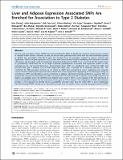| dc.contributor.author | Zhong, Hua | |
| dc.contributor.author | Beaulaurier, John | |
| dc.contributor.author | Lum, Pek Yee | |
| dc.contributor.author | Molony, Cliona | |
| dc.contributor.author | MacNeil, Douglas J. | |
| dc.contributor.author | Weingarth, Drew T. | |
| dc.contributor.author | Greenawalt, Danielle | |
| dc.contributor.author | Dobrin, Radu | |
| dc.contributor.author | Hao, Ke | |
| dc.contributor.author | Woo, Sangsoon | |
| dc.contributor.author | Fabre-Suver, Christine | |
| dc.contributor.author | Qian, Su | |
| dc.contributor.author | Tota, Michael R. | |
| dc.contributor.author | Keller, Mark P. | |
| dc.contributor.author | Kendziorski, Christina M. | |
| dc.contributor.author | Yandell, Brian S. | |
| dc.contributor.author | Castro, Victor | |
| dc.contributor.author | Attie, Alan D. | |
| dc.contributor.author | Schadt, Eric E. | |
| dc.contributor.author | Yang, Xia | |
| dc.contributor.author | Zhang, Bin | |
| dc.contributor.author | Kaplan, Lee Michael | |
| dc.date.accessioned | 2012-02-25T01:49:50Z | |
| dc.date.issued | 2010 | |
| dc.identifier.citation | Zhong, Hua, John Beaulaurier, Pek Yee Lum, Cliona Molony, Xia Yang, Douglas J. MacNeil, Drew T. Weingarth, et al. 2010. Liver and adipose expression associated SNPs are enriched for association to type 2 diabetes. PLoS Genetics 6(5): e1000932. | en_US |
| dc.identifier.issn | 1553-7390 | en_US |
| dc.identifier.uri | http://nrs.harvard.edu/urn-3:HUL.InstRepos:8255739 | |
| dc.description.abstract | Genome-wide association studies (GWAS) have demonstrated the ability to identify the strongest causal common variants in complex human diseases. However, to date, the massive data generated from GWAS have not been maximally explored to identify true associations that fail to meet the stringent level of association required to achieve genome-wide significance. Genetics of gene expression (GGE) studies have shown promise towards identifying DNA variations associated with disease and providing a path to functionally characterize findings from GWAS. Here, we present the first empiric study to systematically characterize the set of single nucleotide polymorphisms associated with expression (eSNPs) in liver, subcutaneous fat, and omental fat tissues, demonstrating these eSNPs are significantly more enriched for SNPs that associate with type 2 diabetes (T2D) in three large-scale GWAS than a matched set of randomly selected SNPs. This enrichment for T2D association increases as we restrict to eSNPs that correspond to genes comprising gene networks constructed from adipose gene expression data isolated from a mouse population segregating a T2D phenotype. Finally, by restricting to eSNPs corresponding to genes comprising an adipose subnetwork strongly predicted as causal for T2D, we dramatically increased the enrichment for SNPs associated with T2D and were able to identify a functionally related set of diabetes susceptibility genes. We identified and validated malic enzyme 1 (Me1) as a key regulator of this T2D subnetwork in mouse and provided support for the association of this gene to T2D in humans. This integration of eSNPs and networks provides a novel approach to identify disease susceptibility networks rather than the single SNPs or genes traditionally identified through GWAS, thereby extracting additional value from the wealth of data currently being generated by GWAS. | en_US |
| dc.language.iso | en_US | en_US |
| dc.publisher | Public Library of Science | en_US |
| dc.relation.isversionof | doi:10.1371/journal.pgen.1000932 | en_US |
| dc.relation.hasversion | http://www.ncbi.nlm.nih.gov/pmc/articles/PMC2865508/pdf/ | en_US |
| dash.license | LAA | |
| dc.title | Liver and Adipose Expression Associated SNPs are Enriched for Association to Type 2 Diabetes | en_US |
| dc.type | Journal Article | en_US |
| dc.description.version | Version of Record | en_US |
| dc.relation.journal | PLoS Genetics | en_US |
| dash.depositing.author | Kaplan, Lee Michael | |
| dc.date.available | 2012-02-25T01:49:50Z | |
| dash.affiliation.other | HMS^Medicine-Massachusetts General Hospital | en_US |
| dc.identifier.doi | 10.1371/journal.pgen.1000932 | * |
| dash.authorsordered | false | |
| dash.contributor.affiliated | Zhang, Bin | |
| dash.contributor.affiliated | Kaplan, Lee | |


